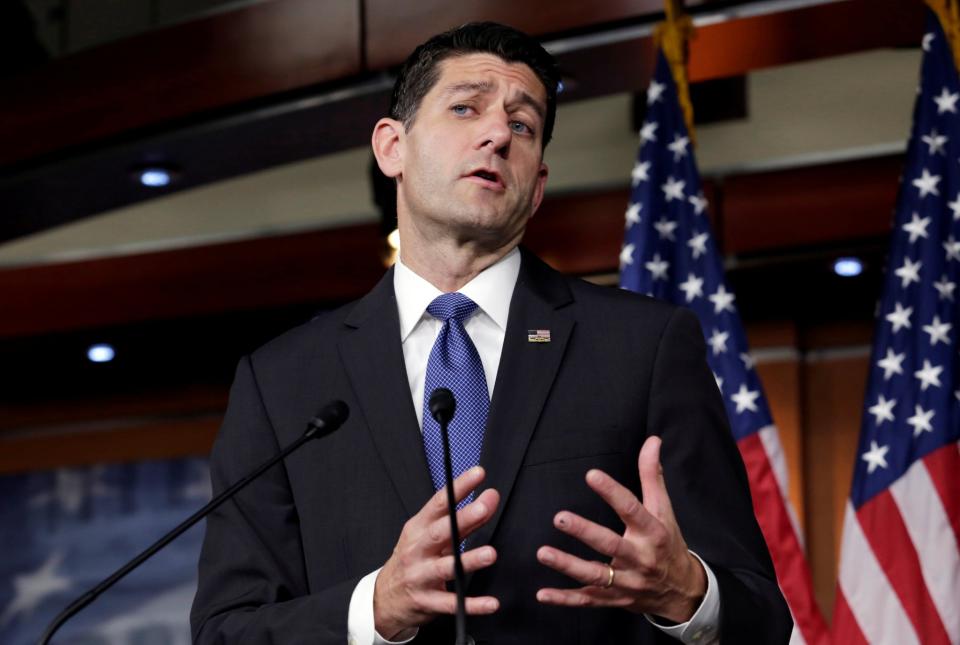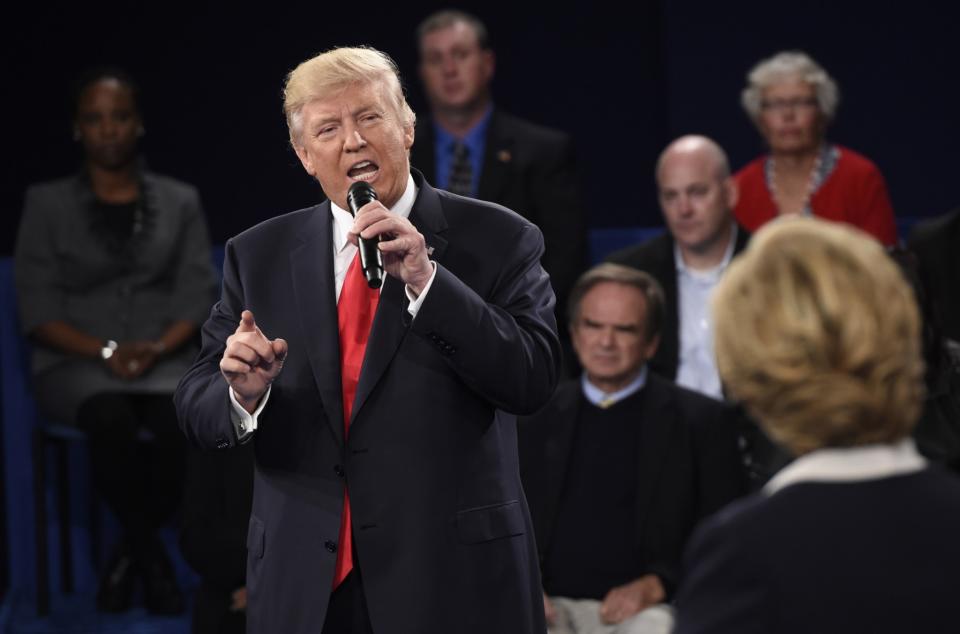Paul Ryan’s impossible choice
Oh, to have been a fly on the wall with House Speaker Paul Ryan when he watched Donald Trump threaten to jail his political opponent if he wins.
Ryan, of course, made Trump’s disregard for the U.S. Constitution and its limits on the presidency one of his core reasons for not endorsing the Republican presidential nominee right away in May.
But Sunday night, Trump not only crossed a line that has never in American history been transgressed — “You’d be in jail,” he said to Democratic nominee Hillary Clinton when she raised the prospect of his presidency — but his campaign doubled down on it after the debate. It posted a picture of Trump on Facebook with the words “She would be in jail.” Top Trump aides tweeted out the same photo, and former New York Mayor Rudy Giuliani encouraged the idea in a televised conversation with Trump supporter and Fox anchor Sean Hannity after the debate.
The question Republican leaders like Ryan faced after Sunday night was, “Do we do what we think is right and denounce Trump once and for all, and risk losing our majorities in hopes we can save the party long term? Or do we hang on for dear life and hope we can clean up the damage after the election?”
Ryan answered that question to some extent Monday morning when he told his fellow House Republicans that he would no longer defend Trump and was, as spokeswoman Ashlee Strong put it, “focused entirely on protecting our congressional majorities.”
Trump fired back on Twitter midday:
Paul Ryan should spend more time on balancing the budget, jobs and illegal immigration and not waste his time on fighting Republican nominee
— Donald J. Trump (@realDonaldTrump) October 10, 2016
Ryan and Trump are now in open war with each other, although Ryan has explicitly not unendorsed Trump. Ryan’s official position is that he supports him for president over Clinton, but that Trump is going to lose because of his own mistakes. And so the goal, Ryan is arguing, is to keep a majority to keep a check and balance against a Democratic president.
The question is whether that’s a politically effective line. One Republican operative working on a handful of House races said that Trump’s poll numbers are plummeting so fast away from the GOP that this might not be enough. And, the operative said, it’s hard to argue that a party whose brand has become so “toxic” should be entrusted with anything.
I had heard from multiple sources close to House Republican leadership and to Ryan himself that there had been fairly serious talk Saturday and Sunday of taking some action to distance the party from Trump, after the disclosure Friday night of his lewd comments in 2005 about groping and trying to have sex with women.

And if Trump and his campaign continued to talk about jailing Clinton, it was hard to see how Ryan could support a candidate whose actions are so dangerous to the stability of America’s democracy.
But not many independent Republican operatives who I spoke with Sunday night — and I focused only on experienced, battle-hardened vote counters — said Ryan should distance himself from Trump. This was near the start of the debate, when it still wasn’t clear that Trump would deliver a debate performance that, while authoritarian in flavor, sprinkled with references to Clinton as “the devil,” and shot through with his usual falsehoods and exaggerations, was still viewed by many as “strong.”
On Monday morning, Ryan was harangued by angry members of the House Republican conference who were upset he was distancing himself from Trump, according to one congressional aide on the call. They are intimidated by the anger of Trump’s supporters.
Many of these same operatives also said they did not think Trump’s horrible, no good past few days had put the GOP’s House majority — a 60-seat edge — in danger. “We aren’t in that zone yet,” said Mike Shields, president of the Congressional Leadership Fund, a super-PAC aligned with Ryan that is spending $20 million to help the GOP keep its House majority. But a few minutes after midnight, a House leadership aide texted me: “House in play.” I asked if this was based on any actual data. Yes, the aide said, but more will need to come in over the next few days to be certain.
These two things — the likelihood of losing the House and of leaders like Ryan ditching Trump — are linked. If it becomes clear that Trump’s scorched-earth campaign is going to lose both the Senate and the House for Republicans, then there is no reason for Ryan and other Republicans to stand by him. But if it’s close, and the outcome is in question, many Republicans think a decision to follow principle and “do the right thing” would actually be the wrong thing because it would give total control of the government to Democrats.
The immediate reaction to the debate was that Trump might have applied a tourniquet to his wound to stop some of the bleeding, and would be able to stave off a wholesale party revolt.
But Trump has put the GOP in a nearly untenable position over the past few days and on Sunday night. He’s done two simultaneous things: alienated groups of voters like suburban women who have been crucial to winning in swing states over the past few presidential cycles, and excited his base voters, who are also key for Senate races in states that will decide the majority. Now any move to repudiate Trump would infuriate some of the most committed Republican voters who are with him.
“I’m just giving you the political reality, and this is the political reality,” Joe Scarborough said on MSNBC’s “Morning Joe” on Monday. “Donald Trump delivered the attack against the Clinton machine that the Republican base in Middle America have been waiting for years now. So good luck in Pensacola, Fla., saying, ‘I’m off of Donald Trump.’”

Trump has now created a nightmare scenario that is highly possible. Republicans could fail to win back moderate Republicans and women if they reject Trump, because doing it now looks utterly calculated. And they would also turn off Trump’s most loyal supporters, egged on by Trump himself, who has already made clear he will attack Republicans who abandon him. The carnage at the ballot box would be immense.
But for all the hypothetical scenarios, one Republican operative who had a senior role on Mitt Romney’s 2012 presidential campaign said he wanted Ryan “for one time [to] do what’s in your heart, not your brain.”
“Do what’s right,” he said.
And Terry Sullivan, a senior adviser to the presidential campaign of Sen. Marco Rubio, R-Fla. — and now working for a super-PAC in Rubio’s Senate reelection campaign — said he would, in fact, advise Ryan to unendorse Trump.
“First, you’ll be able to look yourself in the mirror and be on the right side of history,” Sullivan said. “Second, we have to save the Republican brand.”
Sullivan declined to discuss Rubio’s position, which has been to denounce Trump at times while still endorsing him. Sullivan cannot communicate with Rubio’s campaign under federal election law.
Trump, Sullivan said, “is gonna lose. So we have to think beyond the election. We can’t be the party that is painted with the broad brush of Trump’s rhetoric. We have to begin to distance so we don’t pay the price after the election.”
This post was last updated 1:50 p.m.



